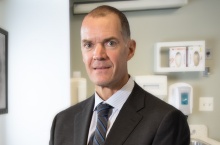Leslie J. Bisson, MD
Associate Dean of Clinical Transformation

Dr. Leslie J. Bisson, MD, collaborates with stakeholders to develop and implement strategic plans to improve clinical quality, patient and clinician satisfaction, and care delivery to make a positive impact on the health of our community.
An accomplished orthopaedic surgeon, he holds several positions, including the June A. and Eugene R. Mindell, MD, Professor and Chair of the Department of Orthopaedics at the Jacobs School; medical director and team orthopaedic surgeon for the Buffalo Bills and Buffalo Sabres; team orthopaedist for SUNY Buffalo State, and president of UBMD Orthopaedics & Sports Medicine. In addition, he sees patients at his office in Amherst.
Dr. Bisson received his medical degree from the Johns Hopkins School of Medicine. He completed an internship in general surgery at Johns Hopkins, a residency in orthopaedic surgery at the Hospital for Special Surgery and a fellowship in sports medicine at the American Sports Medicine Institute.
He has lectured nationally and internationally, published dozens of peer-reviewed articles, and serves on the editorial boards of high-impact sports medicine scientific journals. Dr. Bisson joined the Jacobs School in 2007 as the director of the orthopaedic sports medicine fellowship.
His research, teaching, and clinical practice focus on the prevention, treatment, and rehabilitation of soft tissue injuries, with a particular emphasis on the treatment of degenerative knee conditions, ACL injuries and rotator cuff tears.
Dr. Bisson and the medical team with the Buffalo Bills were recognized for their lifesaving emergency response to the collapse of Bills safety Damar Hamlin. They were honored with the Pat Tillman Award for Service at the ESPY Awards, an NFL Honors Award, the American Heart Association CPR Award, among several others. In the aftermath of Hamlin’s recovery from cardiac arrest, Dr. Bisson has spearheaded an effort to bring hands-only CPR training to Buffalo’s historically underserved communities.